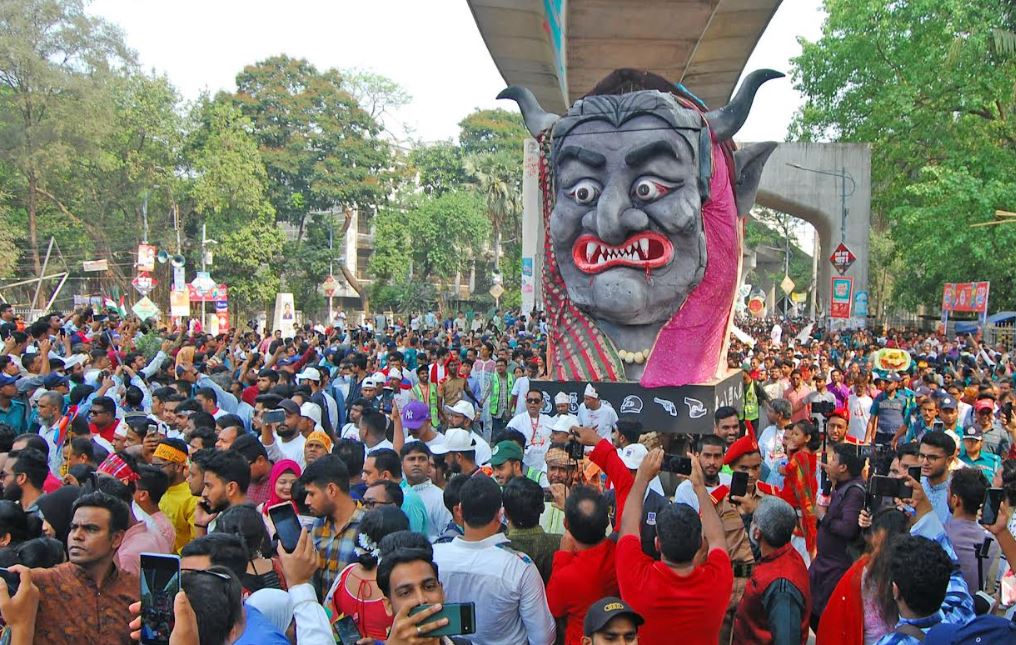Nation celebrates Pahela Baishakh, the first day of the Bengali New Year 1432, on Monday with vibrant festivities, cultural programmes and traditional enthusiasm across the country.
This year’s New Year festivities carry a distinctly different atmosphere following a major political transition.
It marks the first Pohela Baishakh celebration since the government change triggered by a mass student and public uprising on August 5. Reflecting this shift, the traditional celebration has been infused with a renewed spirit of social and political consciousness, also with some criticisms from supporters of the past regime.
One of the most notable changes was the renaming of the iconic “Mangal Shovajatra” to “Baishakhi Ananda Shovajatra” (Joyful New Year Parade). A key highlight of the event was the symbolic motif of the “Face of Fascism”. Although the original structure was destroyed in an act of “sabotage”, students of Dhaka University’s Faculty of Fine Arts rebuilt it.
Among the many traditional motifs, two installations particularly drew attention — a giant water bottle commemorating slain protester Mugdha from the recent uprising, and a sign that read “36 July,” referencing the symbolic date of the movement.
Another striking feature was a piece titled “Fragmented Watermelon” — an artistic show of solidarity with Palestine, using the fruit as a metaphor for the Palestinian flag (red, green, and white), recognised globally as a symbol of resistance.
According to the university authorities, this year’s parade included participation from 28 ethnic communities, foreign guests, and representatives from various educational, governmental, and cultural institutions.
In total, 21 large, medium, and small motifs were featured.
Thousands of people took part in the colorful procession, which marched under the theme: “Unity in the New Year, End of Fascism.”
First new year of the new Bangladesh: CA greets the nation
Amidst this nationwide spirit of rebirth, Chief Adviser Muhammad Yunus delivered a video message greeting the nation.
“The 2024 mass uprising has given us an opportunity to build a discrimination-free country. Let us not lose this opportunity. In this New Year, building a discrimination-free Bangladesh should be our pledge,” he said.
Calling Pahela Baishakh a “day of harmony and great unity,” the Chief Adviser said, “Today is the day to make everyone close.” He added, “This New Year is the first new year of the new Bangladesh. Let’s forget all the sorrows, grief, ugliness and bad of the past years and move forward with new determination and enthusiasm.”
Prof Yunus also urged citizens to play an active role in preserving and promoting Bangladesh’s cultural heritage. “Pahela Baishakh is the festival of our lives, the universal festival of Bangalees. Wherever the Bangalees are in the world, today is a day of joy for all of us,” he said.
My liberation lies in light
Traditional Bengali New Year celebrations began at dawn in Ramna, where cultural group Chhayanaut hosted its 58th New Year celebration. The programme commenced at 6:15 am with a flute recital in Raga Ahir Bhairav, welcoming the new year in line with the theme “My Liberation Lies in Light.”
Chhayanaut’s programme embraced themes of nature, light, patriotism, and humanity, set on a semi-circular stage measuring 72 feet by 30 feet at the heart of Ramna Park.
“Borsho Boron is not just a ritual — it’s a reminder of who we are. In music and in light, we renew our collective hope,” said Laisa Ahmed Lisa, Vice President of Chhayanaut and a leading singer of the country, addressing the gathering before the first performance.
In concluding remarks, Chhayanaut Executive President Sarwar Ali said: We envision a radiant nation and society — one where peace, dignity, and security are ensured for all, and where barriers of religion, race, and wealth give way to a tolerant, compassionate community grounded in mutual respect.
Yet, he said: the path to realising this dream has not been without challenges. Even within an independent homeland, the Bengali people’s pursuit of human dignity has witnessed both hope and heartbreak. On this dawn of the new year, we glance through the metaphorical ledger of gains and losses: on one side, the people’s unrelenting yearning for liberation; on the other, the painful realities of discord, violence, the degradation of women and children, and the consequences of intolerance.
“While it is the state’s responsibility to remedy such grievances, society too must shoulder that burden. If we all commit to preserving history and heritage, embracing fearless expression of free thought, and ensuring the unimpeded continuation of our timeless culture — then surely the path to a luminous future of freedom will unfold before us,” he concluded.
Pahela Baishakh disrupted in Chattohram
While New Year festivities unfolded across the country, a shocking incident occurred in Chattogram. Organisers were forced to cancel the Baishakh programme at DC Hill after the stage at Nazrul Square was vandalised on Sunday night (April 13).
The attackers labeled the organisers as “accomplices of fascism.” Six individuals have been detained in connection with the incident.
The DC Hill celebration, organised annually under the banner of the “United Baishakh Celebration Council,” was set to mark its 47th year. According to council member-secretary Mohammad Ali Titu, around 30 to 40 young men approached the stage around 7:45 pm, chanting slogans such as “Beware, collaborators of tyranny.” They proceeded to tear down stage decorations and banners.
Chattogram Metropolitan Police Deputy Commissioner (South) Md. Alamgir Hossain confirmed that six suspects have been taken into custody and brought to the local police station for further investigation.
Jubilation everywhere
People otherwise across the country celebrated the first day of Bengali New Year with with festivities.
Apart from Nababarsha marches and cultural programmes, traditional fairs were arranged across the country– from rural Bangladesh to metropolitan cities.
The day was a public holiday.
Newspapers published supplements and TV channels on aired special programmes marking the Pahela Baishakh.


